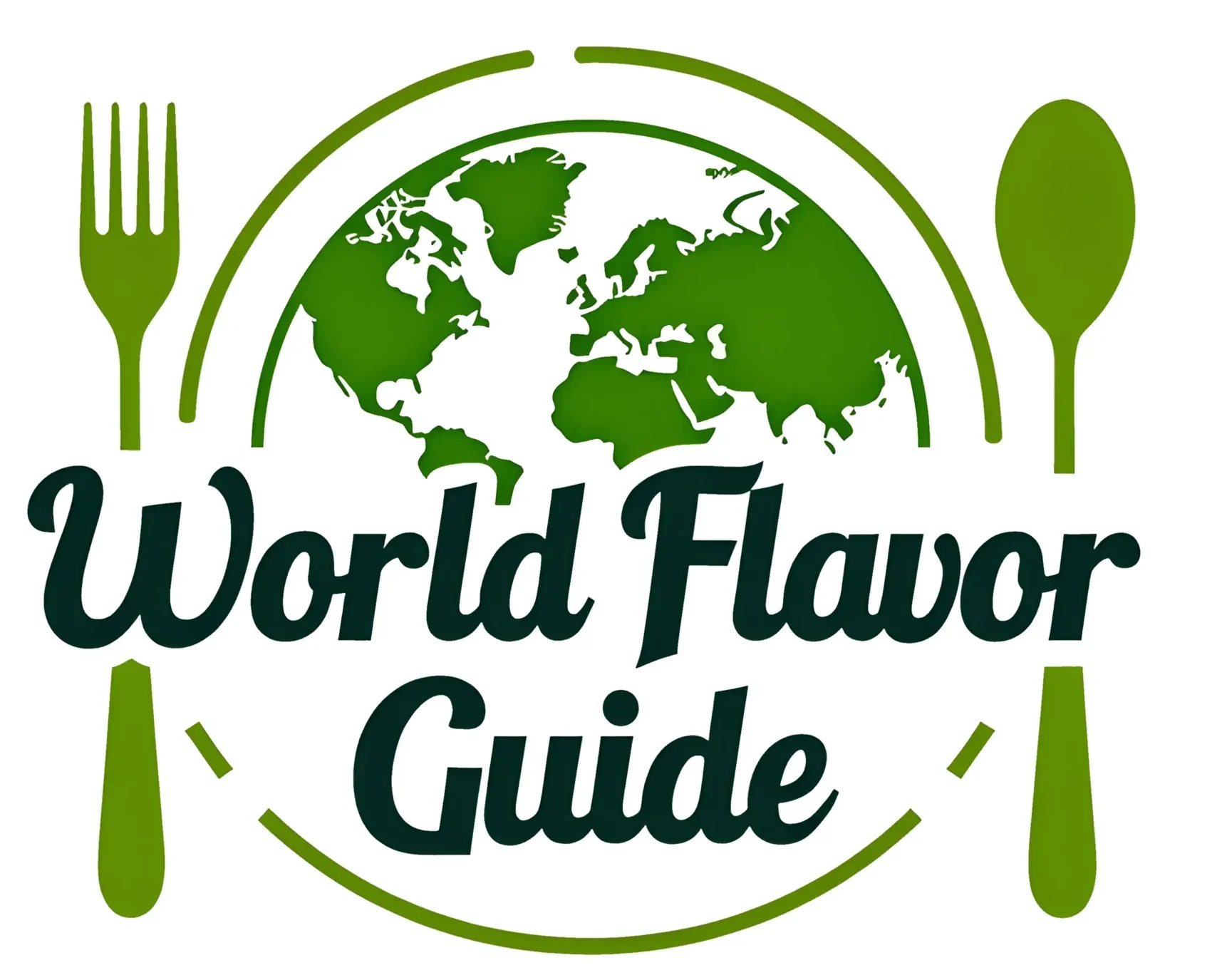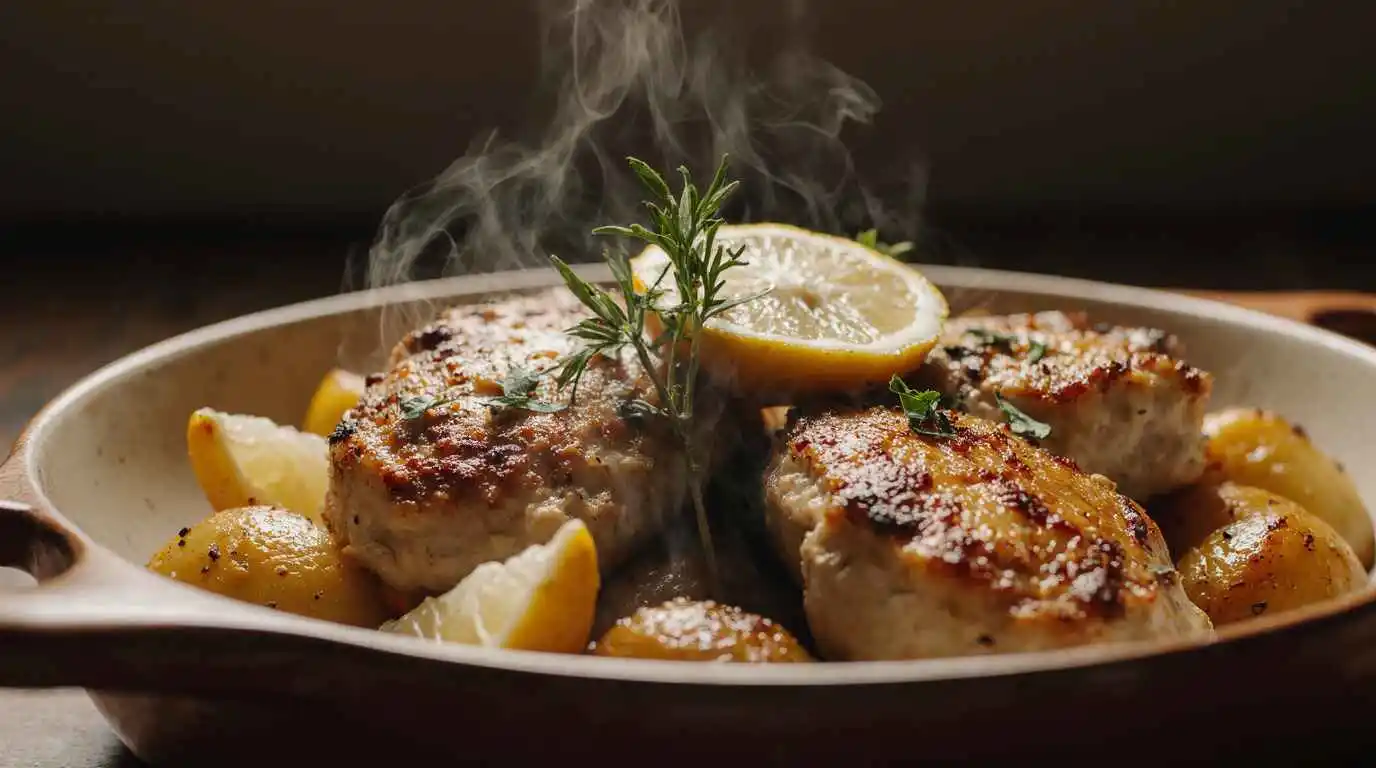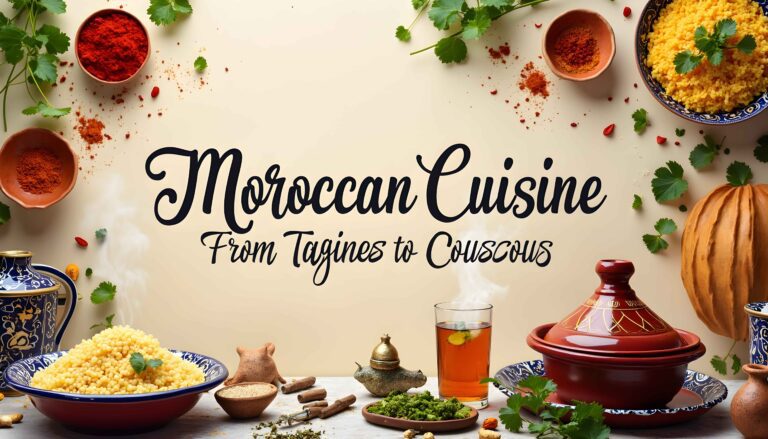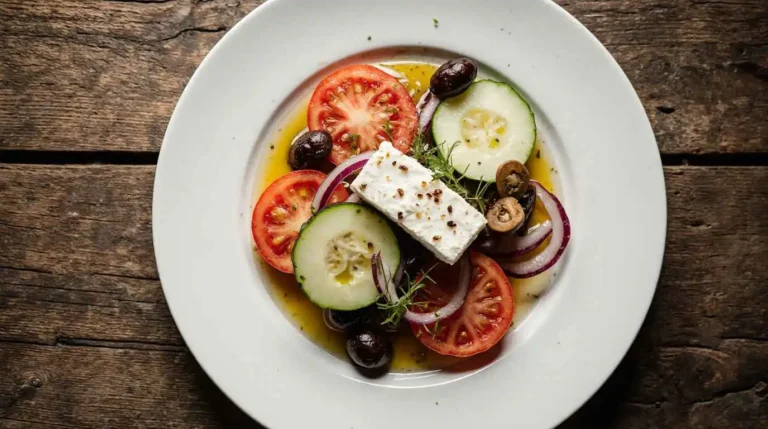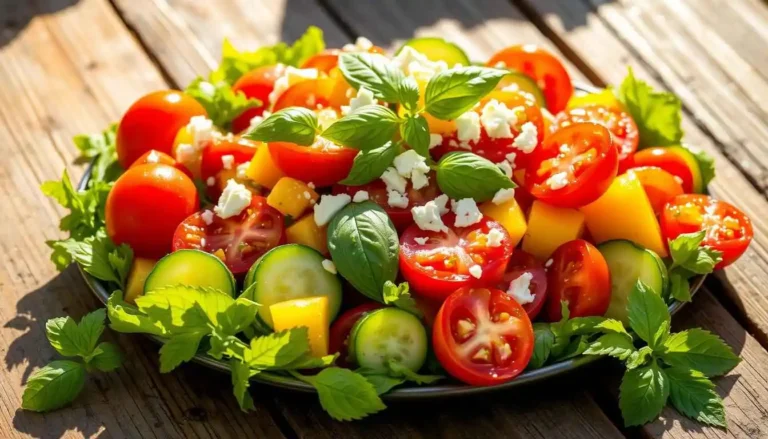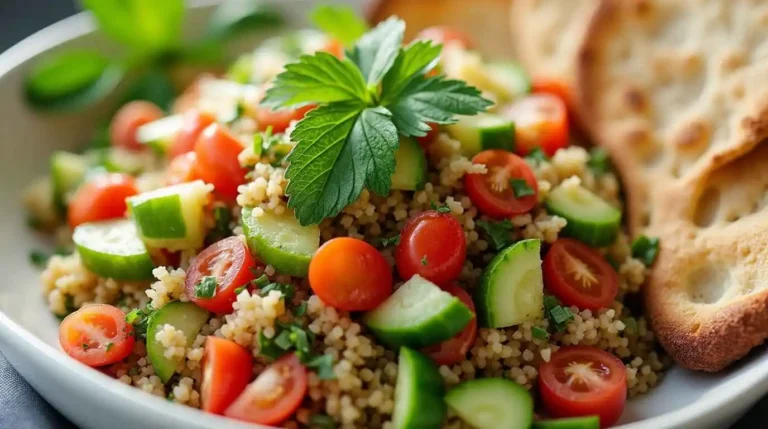Greek Chicken and Potatoes: Ultimate Easy Recipe Guide
Imagine this: the sun-kissed Mediterranean sunlight streaming through your kitchen window as the heady scent of lemon, oregano, and roasting chicken permeates your house. There’s a certain magic to Greek chicken and potatoes that whisks you away to a sunny taverna perched above the Aegean Sea.
This is more than just a chicken and potato dish – it’s a culinary experience that links you to hundreds of years of Mediterranean culture, family, and the simple pleasures of enjoying great food with the people you love.
When you learn this classic Greek chicken and potatoes recipe, you’re not only making supper – you’re making memories, upholding tradition, and serving up the genuine taste of Greece in your very own dining room. Let’s take this tasty journey together.
Table of Contents
What Makes Greek Chicken and Potatoes So Special?
Chicken and potatoes, or “Kotopoulo me Patates” as it’s called in Greece, is the essence of Mediterranean home cooking. This staple dish has been a mainstay on Greek tables for generations and captures the philosophy of turning basic ingredients into something sublime through traditional methods.
The magic is in the ideal balance of tender, herb-seasoned chicken and golden, crispy potatoes that have soaked up all the savory pan juices. In contrast to most chicken and potato dishes that depend on rich sauces or fussy preparations, this Greek gem lets the natural flavors of the ingredients shine through.
The popularity of the dish arises from its amazing versatility. Regardless of whether you are making a weeknight family meal or a special occasion, Greek chicken and potatoes impress with little effort. One-pan cooking also equates to less cleaning up while achieving maximum flavor development, which is perfect for busy home cooks who won’t settle for less in terms of taste.
What makes this recipe stand out, however, is that it’s based on the Mediterranean diet – a dietary pattern hailed by nutritionists across the globe for its numerous health benefits. The harmony of lean protein, healthy fats from olive oil, and nutrient-dense vegetables makes for a well-rounded meal that feeds both the body and the soul.
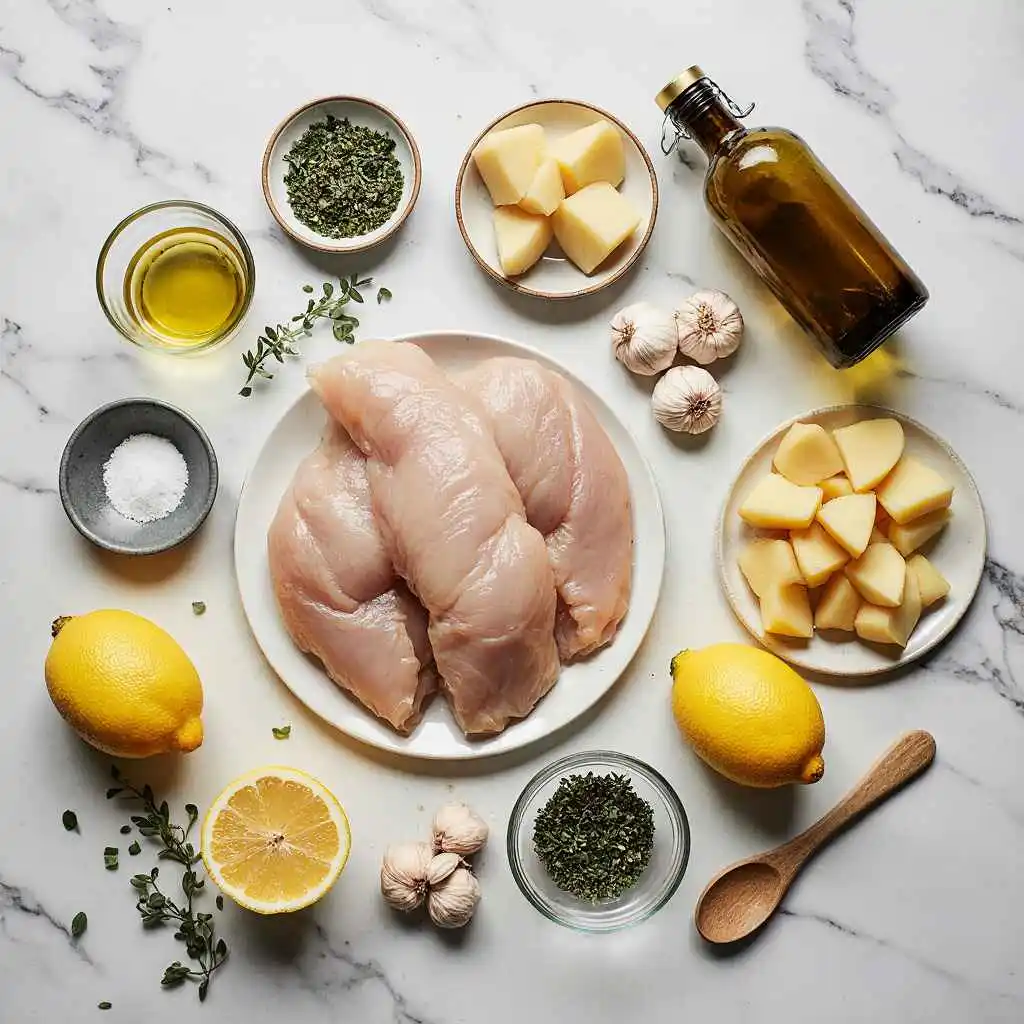
Key Ingredients for Traditional Greek Chicken and Potatoes
Authentic Greek chicken and potatoes are made with attention to ingredient quality. Quality is of the utmost importance in this elegant, simple dish, as each element is vital to the outcome of the flavor.
Primary Ingredients
| Ingredient | Quantity | Notes |
|---|---|---|
| Whole chicken (cut into pieces) | 3-4 lbs | Or chicken thighs and drumsticks |
| Yukon Gold potatoes | 2 lbs | Cut into large wedges |
| Extra virgin olive oil | 1/2 cup | Greek or high-quality preferred |
| Fresh lemons | 3 large | Juiced and zested |
| Garlic cloves | 6-8 | Minced fresh |
| Dried oregano | 2 tablespoons | Greek oregano preferred |
| Fresh oregano | 1/4 cup | Chopped (optional) |
| Sea salt | 2 teaspoons | Or to taste |
| Black pepper | 1 teaspoon | Freshly ground |
| Yellow onion | 1 large | Sliced |
| Chicken broth | 1 cup | Low-sodium preferred |
| Fresh parsley | 1/4 cup | For garnish |
Quality Sourcing Tips
Your chicken and potatoes will be only as good as the ingredients you use. Use free-range chicken if possible, as it has better flavor and texture. The potatoes must be firm and free of blemishes – Yukon Gold potatoes are excellent because they retain their shape when cooked and form a beautiful golden crust.
Greek oregano is quite different from standard oregano, with a stronger, earthier flavor that’s necessary for true flavor. If Greek oregano is not available, substitute with high-quality dried oregano and use a bit less.
The olive oil is both a cooking medium and a flavor component, so go for extra virgin olive oil with a fruity, full-bodied character. Greek olive oil types are perfect, but any good Mediterranean olive oil will do beautifully.
Step-by-Step Guide to Perfect Greek Chicken and Potatoes
Making restaurant-style Greek chicken and potatoes at home involves technique and attention to detail. Use this step-by-step guide to get it just right every time.
Preparation Phase (30 minutes)
- Preheat the oven to 400°F (200°C) and place the rack in the middle.
- Prepare the chicken by patting it completely dry with paper towels. This crucial step ensures proper browning and crispy skin.
- Slice the potatoes into big wedges, about 2-3 inches long. Do not cut them too small, or they will fall apart while cooking.
- Prepare the marinade by whisking together olive oil, lemon juice, minced garlic, oregano, salt, and pepper in a big bowl.
- Marinate the chicken for at least 15 minutes, although 2-4 hours yields even more intense flavor penetration.
Cooking Process (90 minutes)
- Place the chicken pieces skin side up in a big roasting pan or baking dish, making sure they’re not crowded.
- Add the potato wedges around the chicken, tossing them with any leftover marinade.
- Scatter the sliced onions around the pan, wedging them between the potato and chicken pieces.
- Pour the chicken broth into the bottom of the pan, taking care not to pour it directly over the chicken skin.
- Roast 45-60 minutes, then test for doneness. The chicken should have an internal temperature of 165°F (74°C).
- Raise oven temperature to 425°F (220°C) during the last 15 minutes to get golden, crunchy skin.
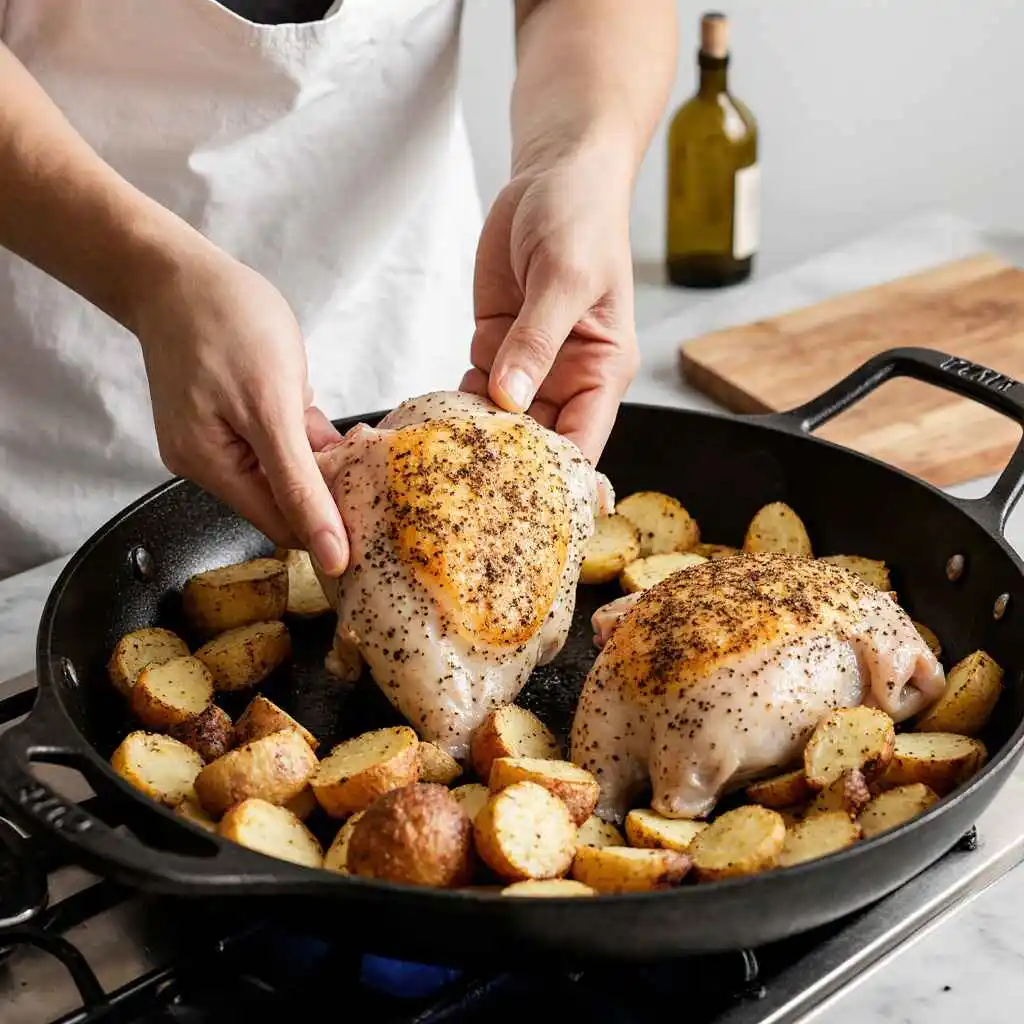
Professional Tips for Success
- Don’t overcrowd the pan – if necessary, use several pans to allow for even browning
- Turn the potatoes halfway through cooking for even browning
- Baste occasionally with pan juices for maximum flavor
- Let stand for 10 minutes before serving to permit juices to redistribute
Mastering the Art of Greek Seasoning
The unique taste of Greek chicken and potatoes owes much to the subtle balance of Mediterranean spices and herbs. Knowing how to layer the flavors will take your dish from good to phenomenal.
Classic Herb Blends
Greek cooking extols oregano over all other herbs, and this recipe highlights its earthy, somewhat bitter flavors perfectly. The trick is to use both dried and fresh oregano to add depth without making the dish one-dimensional. Dried oregano delivers the underlying flavor that infuses the meat as it cooks, and a finish of fresh oregano perks up the whole dish.
Lemon is equally vital, functioning as both an acid and an aromatic component. The citrus slices through the fattiness of the chicken while balancing the earthiness of the oregano. Fresh lemon juice is always essential – bottled juice can’t begin to match the bright, multifaceted flavor of fresh citrus.
Garlic draws these flavors together, sweetening and mellowing out during the extended cooking time. Be generous with amounts – Greek cuisine welcomes strong garlic flavors that mellow so well in the oven.
Balancing Flavors
To achieve a balance of flavor is to know how every ingredient plays a role in the overall flavor profile. The olive oil transports flavors and adds richness, the lemon adds acidity and brightness, and the herbs add earthiness and complexity.
Begin with the recommended measurements, then modify to taste. If you like a stronger citrus flavor, introduce more lemon juice in the final 15 minutes of cooking. For more herbaceous intensity, top the finished dish with fresh oregano.
Keep in mind that flavors intensify while cooking, so what may taste under-seasoned at the beginning will become a well-balanced dish by the time it is completed.
Cooking Methods: Oven vs. Stovetop Greek Chicken and Potatoes
Though classic Greek chicken and potatoes are generally made in the oven, contemporary home cooks have had success with adapting this recipe to the stovetop. Both methods have their advantages and yield subtly different outcomes.
Oven-Baked Benefits
Oven roasting is still the best way for real Greek chicken and potatoes. The consistent, enveloping heat ensures even cooking while enabling the skin to become crispy nicely. The greater surface area of a roasting pan has enough room for all the ingredients without crowding the pan, which ensures good browning.
The oven technique is also convenient – after you’ve put everything in the pan, you can more or less forget about it as it cooks. This hands-off cooking makes it ideal for when you’re entertaining or cooking several things at once.
Temperature regulation is more even in the oven, lessening the possibility of burning or irregular cooking. The chicken skin is crisped by the radiant heat from the top while the constant bottom heat guarantees the potatoes are cooked through.
Stovetop Methods
Stovetop cooking provides more control and possibly quicker cooking times. Begin by browning the chicken pieces in a large heavy pot or Dutch oven. This initial browning develops a rich fond that will add depth to the overall dish.
After browning, take out the chicken and sauté the onions until they are translucent. Then add potatoes, seasonings, and liquid, and put the chicken back in the pot. Simmer covered on low heat, stirring every now and then to prevent burning at the bottom.
Stovetop cooking is especially successful for small batches or when oven space is constrained. It is also easy to make seasoning adjustments while cooking, tasting, and adjusting along the way.
Perfect Side Dishes and Wine Pairings
Chicken and potatoes, Greek-style, are filling enough to be a meal in themselves, but the proper side dishes will enhance the experience of eating and add textural contrast to the dense, rich main course.
Classic Greek Accompaniments
A traditional Greek country salad (horiatiki) makes an ideal refreshing contrast to the hot, herb-seasoned chicken and potatoes. The juxtaposition of crunchy cucumbers, ripe tomatoes, pungent red onions, and rich feta cheese yields a cool contrast that cleanses the palate between bites.
Green beans (fasolakia) in the Greek style with tomatoes and olive oil provide another classic combination. The bright acidity and soft texture of the vegetables enhance the richness of the chicken’s flavors while providing nutritional diversity for the dish.
Warm pita bread or a crusty Greek bread enables diners to mop up the tasty pan juices – something that is not only accepted but anticipated in the Greek way of eating. The bread turns the tasty cooking liquid into a part of the meal itself.
Nutritional Value of Greek Chicken and Potatoes
This traditional Greek dish aligns perfectly with the Mediterranean diet, which has been extensively studied and praised for its health benefits. Understanding the nutritional profile helps you appreciate why this recipe represents both delicious and healthful eating.
Protein and Nutrient Content
Chicken is a good source of complete protein, which has all the essential amino acids required to maintain and grow muscle. A serving of chicken provides about 35-40 grams of protein, thus making it a very good option for active people and those who wish to preserve healthy body composition.
The potatoes add complex carbohydrates, vitamin C, and potassium. In spite of popular myths, potatoes are nutrient-rich vegetables that supply energy and essential minerals in a sustained manner. When cooked with olive oil instead of butter or processed fats, they become a component of a heart-healthy meal.
Mediterranean Diet Benefits
The olive oil used in this recipe contributes monounsaturated fats, which have been associated in studies with better cardiovascular health and lower inflammation. The healthy fats also facilitate the uptake of fat-soluble vitamins from the vegetables in the dish.
The spices and herbs, especially garlic and oregano, add antioxidants and anti-inflammatory substances. These phytonutrients can defend against chronic disease and enhance flavor without added sodium or artificial ingredients.
The technique of cooking itself is healthy – roasting the vegetables with olive oil and herbs results in a filling, nutrient-rich meal without the use of processed foods or high levels of saturated fat.
Troubleshooting Common Cooking Errors
Even experienced cooks occasionally encounter challenges when preparing Greek chicken and potatoes. Understanding common pitfalls and their solutions ensures consistently excellent results.
Avoiding Dry Chicken
Dry chicken is the most likely problem home cooks encounter. This is normally the result of overcooking or utilizing pieces of chicken that are too small. Select larger pieces that hold their moisture longer during the longer cooking period.
Good marination makes a huge difference – olive oil and lemon juice form a protective layer that retains moisture in the meat. If you are pressed for time, at least marinate for 30 minutes, but longer is more effective.
Check internal temperature closely, taking the chicken out when it has reached 165°F (74°C). The meat will cook a little more from carryover heat, so don’t leave the oven on longer than the safe temperature.
Achieving Crispy Potatoes
Mushy potatoes are a letdown for all, yet correct method guarantees crunchy outsides and fluffy insides. Slice potatoes into large pieces – tiny chunks will overcook and disintegrate prior to forming a decent crust.
Pat the potatoes dry before adding them to the pan, and ensure they’re well-coated with olive oil. This creates the foundation for browning. Don’t overcrowd the pan, as this creates steam that prevents crisping.
If your potatoes are not browning as much as you’d like, raise the oven temperature to 425°F (220°C) for the last 15-20 minutes of cooking. The increased heat encourages the Maillard reaction that yields an appealing golden color and better flavor.
Variations and Modern Twists on Classic Greek Chicken and Potatoes
Though the traditional recipe is still revered, innovative cooks have crafted a variety of variations that pay tribute to the original while serving various dietary requirements and tastes.
Regional Greek Variations
Various parts of Greece have developed their versions of this traditional dish. Some add tomatoes for additional acidity and color, while others add bell peppers for sweetness and appearance.
Coastal areas may include olives or capers, introducing briny depth that speaks of the sea’s influence. Mountain towns may feature wild herbs such as thyme or rosemary, picked from the hillsides and dried for use throughout the year.
Others add a splash of white wine to the pan drippings, which adds depth to the flavor without altering the dish’s essential nature. This is especially good when the dish is being served to the company.
Health-Conscious Adaptations
For individuals adhering to special diets, a number of adjustments keep the dish’s fundamental nature while meeting nutritional requirements. Employing skinless chicken decreases fat content noticeably without sacrificing great taste.
Sweet potatoes can be substituted for regular potatoes for those who want lower glycemic choices or more beta-carotene. Cooking is the same, although sweet potatoes will be done a bit sooner.
Including additional vegetables such as zucchini, bell peppers, or cherry tomatoes boosts nutritional value while making the dish more colorful and varied. These are especially useful for families who are attempting to add more vegetables to their diets.
Storing and Reheating Your Greek Chicken and Potatoes
Good storage and reheating methods guarantee that your Greek chicken and potatoes flavor is almost as great as when newly cooked. Knowing these methods also makes the recipe perfect for meal prep and intentional leftovers.
Proper Storage Techniques
Let the dish cool to room temperature prior to refrigeration, but do not let it sit at room temperature longer than two hours. Refrigerate in airtight containers for up to four days, keeping the chicken and potatoes in the same container to preserve moisture.
For extended storage, freeze in freezer containers for three months at most. If possible, separate the chicken and potatoes, which might have different thawing needs.
Date and label containers so you can rotate them properly. Freeze individual portions for easy single-serving meals in the future.
Reheating Techniques
Reheating in the oven yields the best results, crispiness returned to the potatoes and the chicken heated through evenly. Heat the oven to 350°F (175°C) and place the food in a single layer on a baking sheet.
Cover to prevent drying, and warm through for 15-20 minutes or until heated through. Remove the foil for the last 5 minutes to crisp the surfaces again.
Microwave heating is good for a fast meal but will not return it to its original texture. Cook on medium power and cover the dish to avoid splattering, heating in short increments and stirring in between.
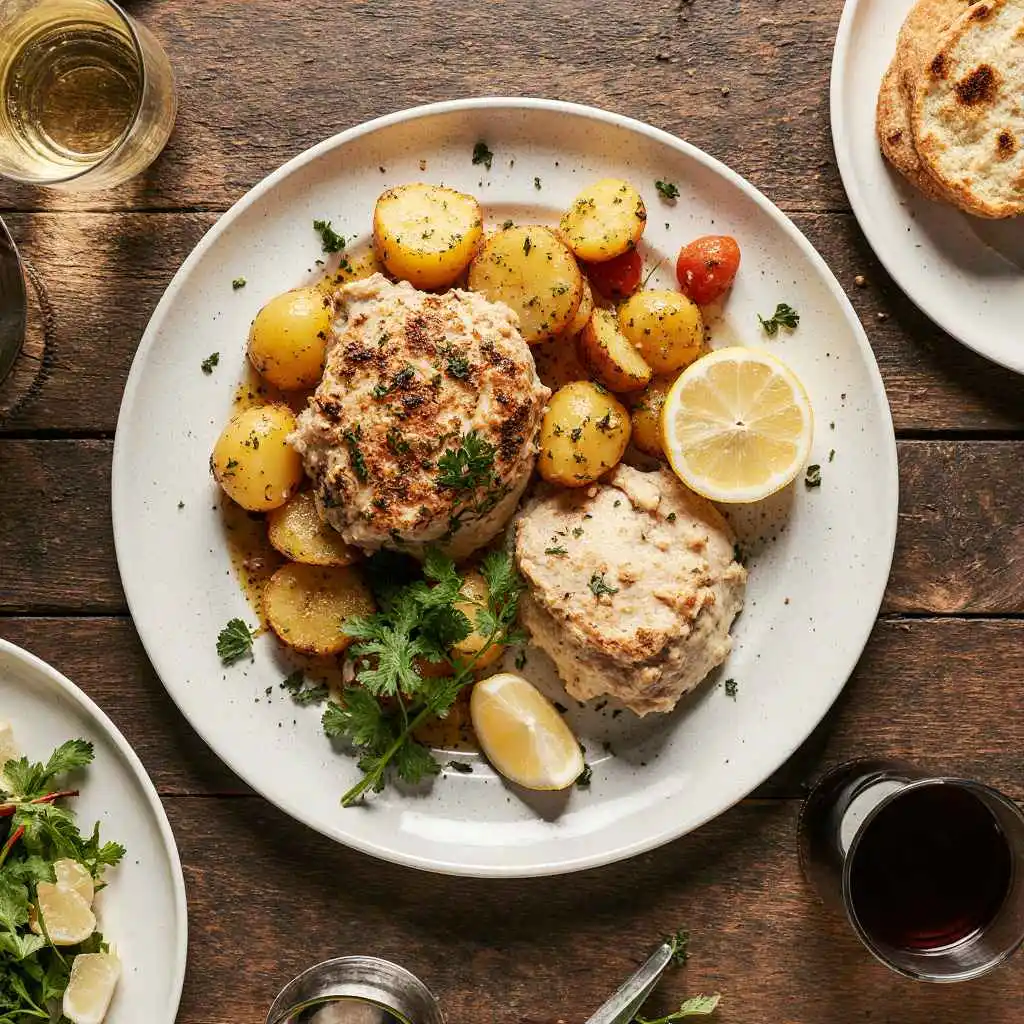
Frequently Asked Questions About Greek Chicken and Potatoes
Can I use boneless chicken for this recipe?
Yes, boneless chicken is suitable for cooking, although bone-in pieces are more flavorful and remain juicier while cooking. If you’re using boneless chicken, cook for approximately 15-20 minutes less and keep a close eye on the temperature to avoid overcooking.
What if I don’t have Greek oregano?
Regular dried oregano can be used as a substitute, but with about 25% less, since it is stronger. You can also combine regular oregano with a pinch of marjoram to come close to the Greek oregano taste.
Can this dish be prepared in advance?
Yes, you can prep the whole dish up to putting it together in the pan, then refrigerate overnight. Add 10-15 minutes to the cooking time if baking straight from the refrigerator.
How do you get potato skins to be crispy?
Dry the potatoes thoroughly before seasoning, apply lots of olive oil, and do not crowd the pan. If they are not browning enough, turn up the oven heat for the last part of the cooking time.
How do I determine when the chicken is cooked to perfection?
Use a meat thermometer to test the thickest part of the chicken – it should hit 165°F (74°C). The juices should be clear when pierced with a fork.
Can I include other vegetables in this recipe?
Yes! Bell peppers, zucchini, cherry tomatoes, and onions all do great. Soft vegetables such as zucchini add the final 30 minutes of cooking to avoid overcooking.
Conclusion
Greek chicken and potatoes is much more than a mere dinner dish – it’s a triumph of Mediterranean culinary philosophy that elevates humble ingredients to remarkable heights. With some attention to technique, good ingredients, and age-old practices, you can achieve a dish on par with the finest Greek tavernas while uniting your family around the supper table.
What’s beautiful about this recipe is how accessible it is. Exotic ingredients and complex techniques aren’t required to make it shine. As you practice, you’ll find yourself gaining an intuitive sense of how the flavors interact, and you’ll be able to tweak seasonings and timing to your heart’s desire.
Keep in mind that cooking is an art and a science. Though sticking to the recipe gives you a great starting point, don’t be shy about tasting and making adjustments along the way. Some ovens are hot, some like their lemon extra, and some like more herbs – it’s these differences that make home cooking personal and special.
Whether you’re making this dish for a low-key family dinner or a celebratory feast, Greek chicken and potatoes provide enjoyment that goes far beyond the plate. It links us to Mediterranean customs of generosity, good ingredients, and the joy of sharing tasty food with those we love.
Now it’s your turn to go into your kitchen and prepare this enchanted dish for yourself. Your friends and family will be grateful, and you’ll understand why this recipe has been a cherished favorite in Greek households for so long. The scents alone will take you to the sun-kissed islands of Greece, and the tastes will have you wanting more.
Begin with good ingredients, adhere to the methods described herein, and have faith in the process. In no time, you’ll be serving restaurant-quality Greek chicken and potatoes while making memories that will last a lifetime at your dinner table.
Tried This Recipe? Tell Us What You Think!
There are no reviews yet. Be the first one to write one.
